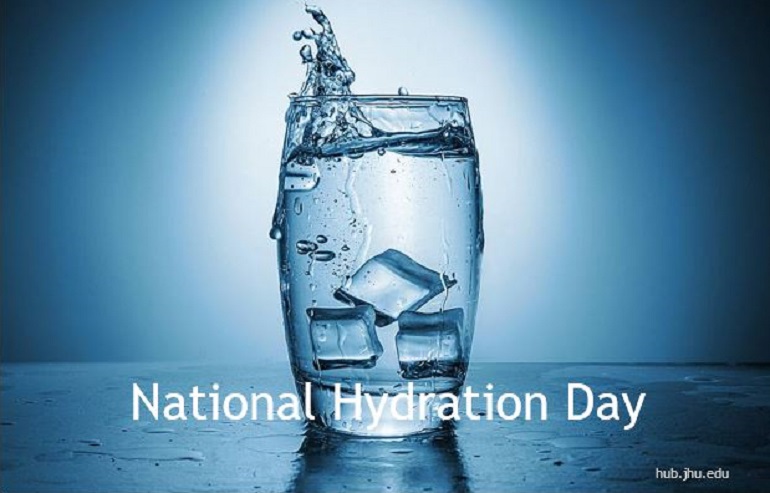
National Hydration Day
Jun 23, 2023
It’s not 8 glasses a day anymore.
You may already know that the average human body is more than 60% water. Water makes up almost two-thirds of your brain and heart, 83% of your lungs, 64% of your skin, and even 31% of your bones. It’s involved in almost every process that keeps you alive; it’s essential for your survival!
It not only helps to regulate your temperature, transport nutrients, remove waste, lubricate your joints and tissues, but it also helps maintain the delicate balance of electrolytes and fluids in the body.
You probably realize that we lose water when we breathe, sweat, urinate, and metabolize food and drink into energy. If you don’t replace that fluid, your health can go downhill, and fast. Without food, your body can keep ticking for as long as three weeks or more. But without water, you’ll die in only a few days. There are just too many systems that depend on it.
Water also helps with fullness cues, it can improve cognitive function, mood, physical performance, and can prevent health problems like constipation, kidney stones, and urinary tract infections.
What’s the right amount?
8 glasses a day isn’t wrong, but current research says the amount should vary depending on age, gender, and activity level.
Your intake recommendation may vary based on life circumstances, too. For example, if you live in a hot and humid climate, get a lot of physical activity, are pregnant, or are breastfeeding, you may need more water daily than the average adult.
The National Academy of Science, Engineering and Medicine recommends an average daily water intake of about 125 ounces for men and about 91 ounces for women.
Remember, you can also get a lot of hydration from foods like celery, oranges, strawberries, watermelon, and cucumbers.
How to know if you’re getting enough or too much
Although rare, it is possible to drink too much water. Hyponatremia happens when the amount of water in your system overwhelms your kidneys, and they can’t keep up with a normal filtration rate. The sodium content of your blood becomes dangerously diluted and causes your cells to swell.
But for the majority of the population, the bigger issue is getting enough water. It’s helpful to keep tabs on actual ounces, but the best indicator is your body. When you don’t get enough water, your urine will be dark yellow or amber or you might experience headaches, bad sleep, constipation, or dizziness.
Tips for getting your daily fill
If you aren’t used to getting enough hydration, start with half your body weight in ounces. If you are far below that amount, start increasing slowly over several days or a week or more.
Try ice cold water if you don’t particularly care for water. Or, add sliced fruit to give it flavor. Using a smaller water bottle and refilling more often might be better than filling a large jug for a whole day. Make it a goal to drink so many ounces per hour instead of a day-long goal that might be daunting.
As always, when it comes to your health, your doctor is your best advisor.
Thank you for reading our article. If you want to learn more about Avinity click here or call 612.861.2799. To learn about our awesome senior living communities, click here.
Sources:
Water | The Nutrition Source | Harvard T.H. Chan School of Public Health
The Water in You: Water and the Human Body | U.S. Geological Survey
